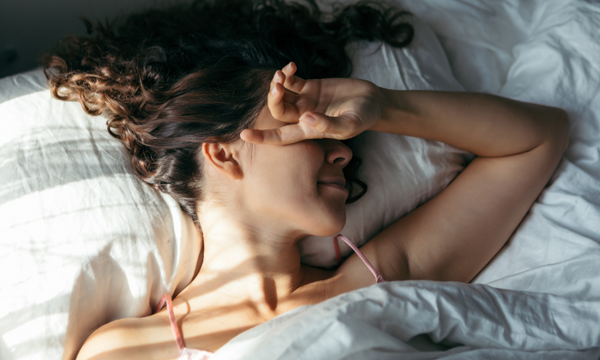Earlier this year we debunked 7 of the most common sleep myths, and by popular demand, we’re back to bust some more. Join us as we set the record straight on 6 more sleep myths…
Myth#8: Sleeping With The Lights On Is Harmless
Humans are diurnal creatures, we are built to be awake when it’s light and sleep when it’s dark. The environment tells us when we should be awake suppressing the sleep hormone, melatonin. And when it’s dark, melatonin production rises, causing us to sleep.
The introduction of artificial light from our tech devices works against our circadian rhythms, leading to disturbances in our sleep. Even low levels of light at night can disrupt our rhythms and increase the risk of awakenings.

Studies have also found that sleeping with the lights on can lead to eye strain and even weight gain. For optimal sleep, it’s best to sleep in a room that’s either pitch black or as dark as possible. It’s also a good practice to dim the lights an hour or two before you sleep to let your body know it’s time for sleep.
Myth#9: You Adapt To Sleeping Less
Daytime drowsiness stabilises after a few nights of poor sleep, but that doesn’t mean your body is getting used to it. Sleep deprivation has both short and long term consequences, affecting your memory, focus, reaction times, decision making, mood, and even IQ.
Persistent sleep deprivation can also have more detrimental impacts on health, including increase risk of mental health disorders and wreaking havoc on your cardiovascular and immune system. It may appear as though you’re getting accustomed to a lack of sleep but the negative health consequences may be accumulating.
Myth #10: Other Than Waking Your Partner, Snoring Is Not An Issue.
While waking up your partner may be reason enough to fix your snoring, there could also be a more serious breathing disorder that should give you the impetus to correct it. Obstructive sleep apnoea is often the cause of loud and frequent snoring, and prevents sufficient amounts of oxygen from entering the lungs.
It’s also commonly believed that there is nothing you can do to prevent snoring, but various methods and lifestyle changes have demonstrated otherwise. Losing weight, physical exercise and quitting smoking are a few things you can do to reduce habitual snoring. Positive airway pressure devices and anti-snoring mouthpieces have also shown to be effective.
Myth#11: It Doesn’t Matter What Time Of Day You Sleep
It’s not just the duration of sleep for that matters, the timing of sleep matters too. To promote high quality sleep, It’s best to have a consistent bed-time and to sleep when it’s dark outside. Aligning your sleeping patterns to the environment maintains proper circadian timing and health.
Inversely, disrupting your circadian rhythms by sleeping at irregular times and when it’s light can cause an array of physical and mental health issues. The world health organisation has even listed shift work as a probable carcinogen for its detrimental impacts on overall health.

Myth #12: Being Able To Fall Asleep Anytime And Anywhere Is A Sign Of A Healthy Sleep System
The ability to fall asleep at any time is typically a sign of sleep problems. Daytime sleepiness is a symptom of sleep deprivation, insomnia, circadian rhythm disorders, and narcolepsy.
It’s natural to struggle to fall asleep when it’s light outside or if you’ve had ample sleep the night before. Sleep is driven by sleep debt, which accumulates throughout the day, and our circadian rhythms which cause melatonin production in the evening.
Without these two factors at play, it’s difficult to fall asleep. The goal shouldn’t be toofall asleep at any time of day, it should be to strive for regular high quality sleep at nighttime.
Myth #13: Working Out Right Before Bed Can Help You Sleep
While exercise is a great way to reduce stress, which in turn helps with the onset of sleep, vigorous exercise right before you sleep is not ideal. Our core body temperature should naturally dip in the evening, whereas exercise drives up body temperature, making it more difficult to enter dreamland.
You should aim to give your body time to relax before sleep, but if you enjoy exercising as part of your bed-time routine, try light stretching or yoga. The melodic breathing exercises during a yoga session have actually been shown to improve the onset of sleep.
Got any sleep questions you want to see busted or proven? Let us know at info@dormusleep.com
